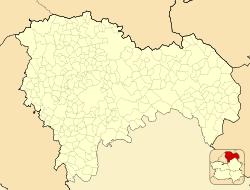This article needs additional citations for verification .(April 2024) |
Castilnuevo, Spain | |
|---|---|
 | |
| Coordinates: 40°48′56″N1°51′23″W / 40.81556°N 1.85639°W | |
| Country | |
| Autonomous community | Castile-La Mancha |
| Province | Guadalajara |
| Municipality | Castilnuevo |
| Area | |
• Total | 19.54 km2 (7.54 sq mi) |
| Population (2024-01-01) [1] | |
• Total | 8 |
| • Density | 0.41/km2 (1.1/sq mi) |
| Time zone | UTC+1 (CET) |
| • Summer (DST) | UTC+2 (CEST) |
Castilnuevo is a municipality in the province of Guadalajara, Castile-La Mancha, Spain. It had 9 residents at the 2004 census (INE).


